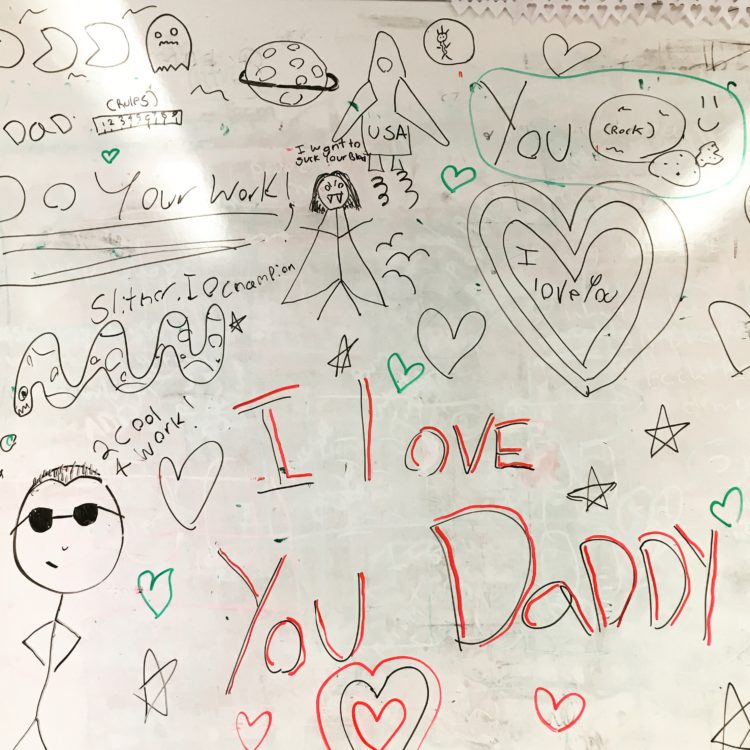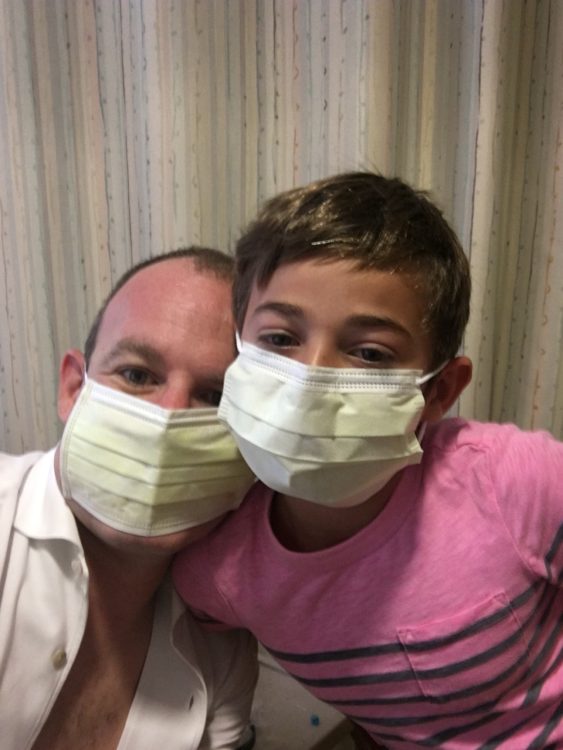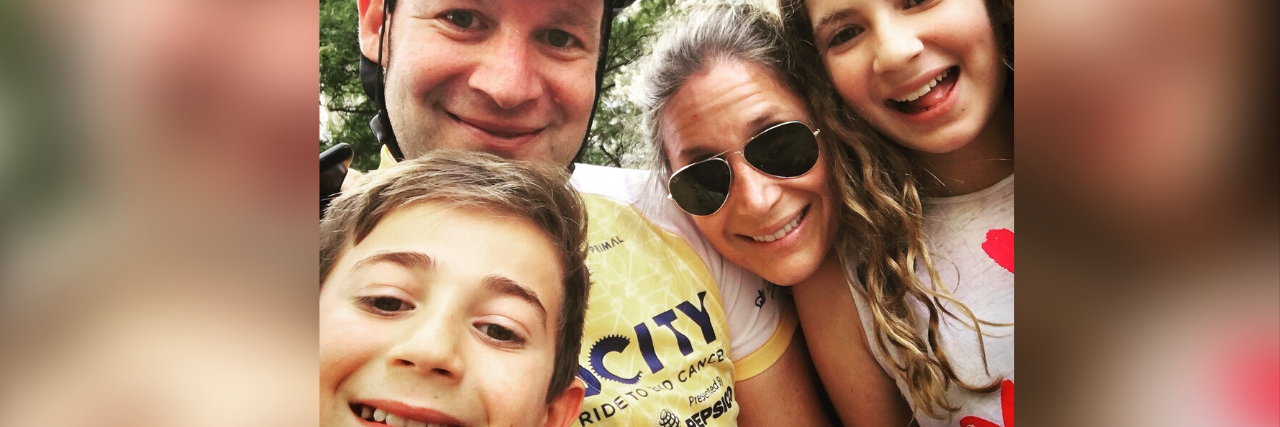By Douglas Rozen
I turned 45 today. Usually, this is a time when people question all the decisions they have made over what is, hopefully, the first half of their life (Am I a good father? Did I pick the right career? Am I happy?). Forty-five is also now the recommended age for normal adults to begin regular screening for colorectal cancer (CRC). As I reflect on my first 45 years, the truth is: If I waited until I was 45 to get a colonoscopy, I would not have this survivor story to share. I’m not sure I would have any story to share.
My story is about a little luck and a lot of positivity. I was diagnosed with Stage III colon cancer in June 2017. My diagnosis was an accident. It was what they called an “incidental finding” — thankfully, because my general practitioner suggested I get a colonoscopy.
You see, I love to bike. It’s a time for me to clear my head, to think through things and to yes, go fast. When you ride a bike a lot, it can lead to some discomfort in your “undercarriage.” So, after putting off going to my doctor for months, I finally went. He examined me and did not find anything suspicious beyond expected irritation. But right before dismissing me, he suggested: “You know, maybe we do a colonoscopy.”
Who am I to argue? A few weeks later, I found myself chugging briny fluid to make sure I was squeaky clean for my exam the next morning. When I woke up after the colonoscopy, the faces on my wife, the doctor and the staff confirmed something was up. My wife looked at me and said, “It will be OK.”
The doctor had a look of concern and said, “We found something.” After explaining I have a tumor in my colon, it still didn’t fully register. I was groggy, and trying to piece it all together. I will never forget leaving when a nurse said to me, “You will be OK. Stay positive.” I had arrived hours before thinking, “Why not?” and now I left thinking, “WTF?!?”
But once we got home, it hit me. No, not the possibility of cancer in my body, or that I might die before my kids graduate high school. What hit me was the nurse saying, “Stay positive.”
I am lucky because since the day I was born, I have been a ray of sunshine. Always smiling. Always finding hope. My parents called me their “sunshine kid” growing up. To this day, no matter the adversity, I view life with Pollyannaish zeal. I knew, no matter what, I was going to beat this — I just knew it.
Within a few days, we got my colonoscopy results in front of a specialist. And within the next week, we were extremely lucky to be meeting with the best at Memorial Sloan Kettering. We quickly learned my condition was very serious, but not yet life-threatening, because we caught it just in time. A few months — maybe a year at most — would have been the difference. My tumor was about the size of a quarter and permeated the internal wall of my colon.
I was also lucky because a week later, my two kids were leaving for sleepaway camp. My wife and I made the difficult decision to not tell them. It was too early. We did not have all the answers. It was one of the hardest things to do, but we knew it was in their best interest. It gave us time to figure out what was next. It allowed us to navigate my diagnosis with the luck of our children not being immediately impacted. For that, we are so fortunate.
We did not have all the answers because the doctors were still determining how to treat me. Should we be aggressive, or take a more conservative approach? I was of the mind to hit me with all the hard stuff. We needed to attack my cancer to make sure there was no doubt it was gone.
Here’s the thing — the only certainty to ensure I could be cured was to have surgery. And surgery meant removing a third of my colon. I remember getting the call from my doctor describing my treatment plan and thinking, “OK, let’s go.”
My treatment would consist of eight cycles of chemotherapy, two weeks apart, followed by 25 days of chemotherapy and radiation together. After that, we would give my body a rest for a month before having surgery to remove a third of my colon.
On July 3, 2017, I got a port put in my chest to enable quick access to my bloodstream. Five days later, I had my first chemotherapy session. I sat there for three hours as chemicals where being pumped into my body. I made jokes to break the ice. The Saturdays immediately following my chemo were the worst. Those eight Saturdays were some of the hardest days. Those were the days I felt like a cancer patient. Those were the days I could do nothing, say little, eat zero and just stare. I felt miserable, but just kept saying, “stay positive.”
After my first chemo session, my kids returned from camp. My wife and I spent weeks figuring out how to talk to them. How do you tell your children you’re sick when they see you as invincible? We met with therapists and had a plan. We picked them up from the airport. We came home to have dinner and after they told all of their stories, I would tell mine. At that moment, I said, “I have something to share.”
Without missing a beat, my 12-year-old daughter looked me in the eyes and asked, “Dad, do you have cancer?”
So much for the well-rehearsed talk track. But I was lucky, because I already went through one chemo session and we could answer every single question including the most important, “Are you going to die?”
The answer was “Someday, but not because of this.” I am forever fortunate that I was able to answer that because of the timing of everything.

Another question my kids asked was, “What’s [chemotherapy] like?”
I decided I would bring each kid to a session. It was one of the best decisions. It removed the fear and concerns about cancer that each kid had in their own ways. They saw how chemo was not something to be afraid of. They became involved in my healing. After the chemo session, we went for lunch, each to wherever they wanted.

This went on for four months. Never once did I miss a day of work. I wanted to, but I didn’t. I kept riding my bike. Not for long distances, but for a few miles. I did not allow cancer to impact how I wanted to live my life, but I also realized I was fortunate I could make that decision. Others are not.
Because of this, I wanted to raise money to help those who were less fortunate. In between my sixth and seventh sessions, I rode a 50-mile ride and raised more than $10,000. I won’t lie — it was hard, but it was important, and my will got me to the end where my family was waiting. The ride was important, not just because of the awareness I caused or the money I raised, but because I could remove some of the stigma about people dealing with cancer. It was also me telling my cancer it would not win. It was me staying positive.
In January 2018, it was time for surgery. The procedure was performed using robots (which is so cool). It went perfectly. I was so lucky, except for a week later, when I got an infection that sent me back to the hospital. But even then, I remember having a pint of ice cream at 4 a.m. thinking about how the little things in life matter so much.
I am now two years cancer-free. Every day, I am physically reminded of my decision to have surgery in ways I care not share. I will be reminded of cancer for the rest of my life. But I am lucky that I get to say that: for the rest of my life.
The truth is that colorectal cancer doesn’t care how old you are. That’s why I want to do something about it. With my kids, we’ve started a campaign called Give a $#!+ to raise money as well as awareness of the warning signs.
To me, cancer is a disease that impacts too many. I believe positivity is the only way through. Every year, on the Monday closest to my surgery date, I now take a “Me Day” to recognize how lucky I am. I spend the day by myself, reflecting on what I have learned through this process, how not to take anything for granted, and committing myself to be better — a better father, a better husband, a better leader, a better person. I have learned to be more emphatic. Cancer has taught me what’s important in ways I did not appreciate before. I have become more patient. But above all else, I have learned to cherish luck. I am lucky that my story does not need to be solely defined by adversity. I am lucky that my story is one that is driven by positivity. Positivity to be here for as long as I can.
—
Douglas Rozen is Chief Media Officer at 360i, as well as a colorectal cancer survivor, avid cyclist and Stand Up To Cancer (SU2C) ambassador. You can follow Doug on Twitter at @dougrozen.
Stand Up To Cancer raises funds and awareness supporting innovative research programs in cancer prevention, detection and to bring new effective treatments to patients faster. The SU2C science portfolio includes significant research to improve colorectal cancer diagnosis and treatment. Among SU2C’s “signature” Dream Teams, an international group of multidisciplinary, multi-institutional researchers are focused on the early detection of colorectal cancer. They are working to improve a stool test to reliably screen for early stage cancer, for high-risk pre-cancerous polyps and for the possible return of cancer after surgical removal of the tumor. Promising results have detected presence of cancer earlier than when the cancer can be detected by typical CT scan imaging.
To learn more, visit StandUpToCancer.org.
Lead photo courtesy of Douglas Rozen

